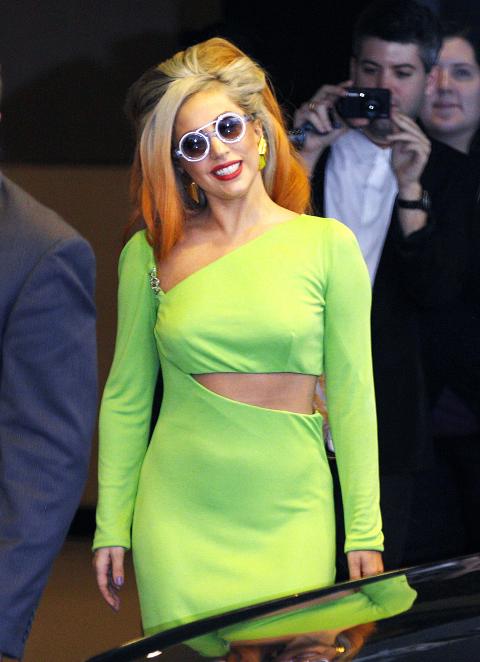The “Mother Monster” — aka Lady Gaga — is in Taipei for a two-night run that began yesterday and ends with a sold-out show tonight at the Taipei World Trade Center Nangang Exhibition Hall (台北世界貿易中心南港展覽館).
The ever-predictable frenzy got underway as soon as the pop sensation stepped off her private chartered plane at Songshan Airport in Taipei on Wednesday. Decked out in a vintage green Versace dress, Lady Gaga greeted reporters and fans at the terminal, “walking unhurriedly, waving at the cameras and blowing kisses,” as the Taipei Times’ sister paper, the Liberty Times, put it.
She then boarded a black Mercedes, protected by a motorcade of M Class Mercedes SUVs, and headed to the W Hotel, where the singer is staying. Naturally, the reporters hopped in their cars and were in hot pursuit, with one TV cameraman even pulling a Dukes of Hazard move, hanging outside the window with his camera on one shoulder.

Photo: Taipei Times
But the real shots to capture were at the W Hotel, where 100 or so “little monsters” got a few minutes of interaction with Mother Monster (albeit from behind a metal fence). Lady Gaga obliged the shrieking fans, approaching them as soon as she stepped out of the car at the hotel, shaking hands and signing autographs.
One female fan, according to Now News (今日新聞網), was lucky enough to attract Lady Gaga’s attention. The student had made a pair of rings, one of which she gave to the singer, who accepted the gift and returned the favor by kissing the matching ring on the student’s hand.
Lady Gaga fans in Taiwan, some of whom shelled out more than NT$12,000 for tickets each for yesterday and tonight’s concerts, will be seeing the singer fulfill a promise to return after giving a free mini-concert in Taichung last year.
But Lady Gaga fans in Indonesia won’t be as fortunate: the diva was denied a permit to hold a concert, which was scheduled for June 3, in Jakarta after some of the country’s Muslim hardliners accused her of, among other things, worshipping Satan.
Back in Mando-pop land, Aska Yang (楊宗緯) is smarting over his failure to get nominated for the best male Mandarin singer gong at the 23rd Golden Melody Awards (第23屆金曲獎). The ceremony takes place next month. Yang, who became a household name as a contestant on the reality show One Million Star (超級星光大道), recruited respected pop singer-songwriter Jonathan Lee (李宗盛) to produce his chart-topping album Pure (原色).
But even that apparently did not impress the Golden Melody committee judges. The China Times quoted one representative as saying that Yang “did not enter the discussion from the start.” There were few surprises for this year’s nominees for best male singer, which include Jam Hsiao (蕭敬騰), Eason Chan (陳奕迅) and Jay Chou (周杰倫).
But all eyes at this year’s awards will be on Singaporean singer Tanya Chua (蔡健雅), pop-rock idols Mayday (五月天) and S.H.E singer Hebe Tien (田馥甄), who each received seven nominations. All three artists are vying for the year’s best Mandarin album and best composer awards.

In the March 9 edition of the Taipei Times a piece by Ninon Godefroy ran with the headine “The quiet, gentle rhythm of Taiwan.” It started with the line “Taiwan is a small, humble place. There is no Eiffel Tower, no pyramids — no singular attraction that draws the world’s attention.” I laughed out loud at that. This was out of no disrespect for the author or the piece, which made some interesting analogies and good points about how both Din Tai Fung’s and Taiwan Semiconductor Manufacturing Co’s (TSMC, 台積電) meticulous attention to detail and quality are not quite up to

April 21 to April 27 Hsieh Er’s (謝娥) political fortunes were rising fast after she got out of jail and joined the Chinese Nationalist Party (KMT) in December 1945. Not only did she hold key positions in various committees, she was elected the only woman on the Taipei City Council and headed to Nanjing in 1946 as the sole Taiwanese female representative to the National Constituent Assembly. With the support of first lady Soong May-ling (宋美齡), she started the Taipei Women’s Association and Taiwan Provincial Women’s Association, where she

Chinese Nationalist Party (KMT) Chairman Eric Chu (朱立倫) hatched a bold plan to charge forward and seize the initiative when he held a protest in front of the Taipei City Prosecutors’ Office. Though risky, because illegal, its success would help tackle at least six problems facing both himself and the KMT. What he did not see coming was Taipei Mayor Chiang Wan-an (將萬安) tripping him up out of the gate. In spite of Chu being the most consequential and successful KMT chairman since the early 2010s — arguably saving the party from financial ruin and restoring its electoral viability —

It is one of the more remarkable facts of Taiwan history that it was never occupied or claimed by any of the numerous kingdoms of southern China — Han or otherwise — that lay just across the water from it. None of their brilliant ministers ever discovered that Taiwan was a “core interest” of the state whose annexation was “inevitable.” As Paul Kua notes in an excellent monograph laying out how the Portuguese gave Taiwan the name “Formosa,” the first Europeans to express an interest in occupying Taiwan were the Spanish. Tonio Andrade in his seminal work, How Taiwan Became Chinese,